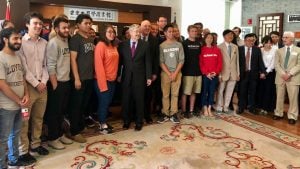
A Jew in China
A Jew in China
by Ariel C. Javeriana Bogota, TBC Spring 2018
I’ve never considered myself as a religious person. Since I was little, I remember not wanting to go to the synagogue or any Sabbath dinner with my family. Even though I come from a traditional Jewish family, I always felt that faith was a gift I didn’t get. Nevertheless, Judaism has always meant a lot to me because it’s a part of my identity as a person, it defines who I am, and it gives me a sense of belonging. That is why, in Colombia -where I live- I’ve joined different groups that have allowed me to play important roles in service of the Jewish community such as being a counselor for Jewish summer camps and teaching Zionism to children.
I didn’t know I was coming to Beijing until two months before I did. I surely didn’t know what to expect from this country and how my experience would be like. It came to my surprise that in the first week, Father Gene –who happened to be my teacher at The Beijing Center – approached me with a couple of books that talked about Judaism in China and offered me the WeChat contact of Beijing’s Lubavitch rabbi, so I could go to the synagogue on Fridays and have Sabbath dinners with them. I won’t lie and say that I didn’t feel a little weird in the beginning but then, the rabbi started singing songs that I knew and we all ended up singing, dancing, and eating together like I would with my family in Bogotá. I remember something the rabbi said before I left: “it doesn’t matter where you come from, Colombia, Russia, America, China. We all know these songs. That’s what makes us family”.
Around March, Father Gene sent me an email telling me that a professor from New York was coming to Beijing and that he was interested in meeting an ancient community of “faithful people” in China that had been living here since the 10th century and that he wanted me to join them. Of course, I accepted and planned my trip before going by doing some research about this particular community. It came to my surprise that the existence of Jews in China was unknown to Europeans until the beginning of the 17thcentury, when Matteo Ricci, was visited by a Jew who had come to Beijing.
Something I learned in our trip is that Ricci had written to the rabbi in the synagogue telling him that the Messiah the Jews were waiting for had come already, to which the rabbi answered that the Messiah wouldn’t come for another ten thousand years. Nonetheless, apparently concerned with the lack of a trained successor, this rabbi offered Ricci his position, if the Jesuit would join their faith and abstain from eating pork.
We got there and met with some people, we met in private in one of the apartments that they use to study to talk about their lives as “God-fearing” people in China. It was difficult to estimate the number of the faithful here, not only because both their English and our Chinese were limited but also because they have had to practice in silence and, as a result, most of them have ended up assimilating or ceasing the practice of their faith. When talking to them, we also noticed an uncommon aspect of their traditions: they had been keeping to a patriarchal line (1) which makes things a little complicated because they are required to convert to receive Israeli citizenship under Alliyah (Law of Return). Even though they didn’t speak the language of the faithful, their community was decreasing, they had kept to patriarchal descent, and even their museum was somehow closed.
By the end of the day, we did some sightseeing of the old town and even saw where the synagogue used to be. At night, we all ate together in a halal restaurant (and therefore kosher) where we chatted for a while and sang to the songs that I sang with the rabbi in Beijing. They knew every single song we sang and the only thing I could think about was how beautiful it is that what brought us together was precisely that: music.





